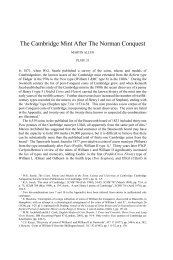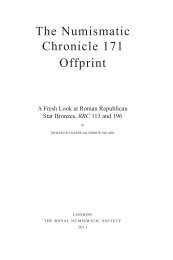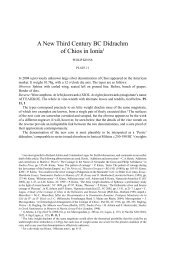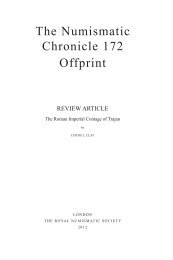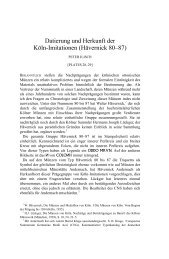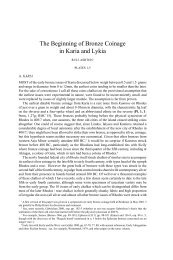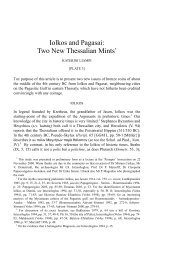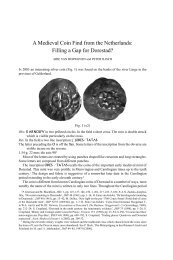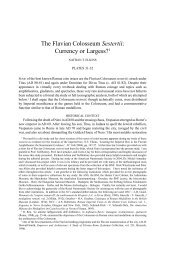The Numismatic Chronicle 171 Offprint - Royal Numismatic Society
The Numismatic Chronicle 171 Offprint - Royal Numismatic Society
The Numismatic Chronicle 171 Offprint - Royal Numismatic Society
Create successful ePaper yourself
Turn your PDF publications into a flip-book with our unique Google optimized e-Paper software.
378<br />
FRANÇOIS THIERRY<br />
This expression is taken from <strong>The</strong> Counsels of Yu the Great: ‘When Earth is at peace,<br />
and Heaven is complete, and the Six Treasuries and the Three Occupations are well<br />
managed, ten thousand generations will reap the results’ (Di ping Tian cheng, liu fu<br />
san shi yun zhi, wan shi yong lai 地平天成,六府三事允治,萬世永賴). 73 This<br />
inscription is frequently seen on the gold and silver coinage of the Nguyễn dynasty<br />
from the Thiệu Trị era (1841–7) to the Thành Thái era (1889–1907). See also type<br />
30.<br />
13. 萬物資生 Vạn vật tư sanh<br />
Ch. Wan shi zi sheng // All living things are born from it.<br />
Inscription found on coins of the Thiệu Trị 74 and Tự Đức 75 eras. <strong>The</strong> reverse illustrated<br />
by Schroeder, no. 163, and attributed to the Minh Mạng era is not genuine.<br />
<strong>The</strong>se four characters are taken from the commentary for the hexagram kun 坤 in the<br />
Book of Changes (Yijing): ‘So effective is the principle of kun that all living things<br />
are born from it, it is gentle obedience to heaven’, (Zhi zai kun yuan, wan wu zi<br />
sheng, nai shun cheng tian 至哉坤元,萬物資生,乃順承天). 76<br />
14. 解慍阜財 Giải uấn phụ tài<br />
Ch. Jie yun fu cai // Resolve resentment, augment wealth.<br />
Inscription found on coins of the Thiệu Trị77 era. <strong>The</strong> reverse illustrated by Schroeder,<br />
no. 164, and attributed to the Minh Mạng era is a coin of the Thiệu Trị era.<br />
<strong>The</strong>se four characters are a contraction of the poem Wind from the South (Nanfeng<br />
南風) attributed to the mythical emperor Yushun 虞舜: ‘<strong>The</strong> softness of the wind<br />
from the South can resolve resentment among my people, the timeliness of the wind<br />
from the South can augment the wealth of the people’ (Nan feng zhi xun xi, keyi jie<br />
wu min zhi yun xi, Nan feng zhi shi xi, keyi fu min zhi cai xi 南風之薰兮,可以解吾<br />
民之慍兮,南風之時兮,可以阜民之財兮). This poem is quoted in Chapter 35 of<br />
Bianyuejie 辯樂解, in Kongzi jiayu 孔子家語. 78<br />
15. 悠久無疆 Du cửu vô cương<br />
Ch. You jiu wu jiang // Far-reaching, without limit.<br />
73 Shujing, I-3, p. 35.<br />
74 CMVS, no. 423.<br />
75 Lacroix, Numismatique annamite, no. 470.<br />
76 Yijing, II, p. 76.<br />
77 Lacroix, Numismatique annamite, no. 457; AS, III, p. 18; CMV, no. 1607; Barker, Historical cash<br />
coins of Viêt Nam, no. 186.<br />
78 This work complements the Analects (Lunyu) of Confucius, and is a collection of anecdotes and<br />
aphorisms about the Master and his main disciples, Zilu, Zixia and Yan Hui. <strong>The</strong> text is known to have<br />
been compiled during the Eastern Han by Wang Su 王肅 (195–256), see Ciyuan, p. 2217; and Loewe,<br />
pp. 258–69. <strong>The</strong> Chinese Text Project (Baijia zhuzi 百家諸子, http://ctext.org) website gives a digital<br />
version of most of the great philosophical and historical texts of ancient China.



